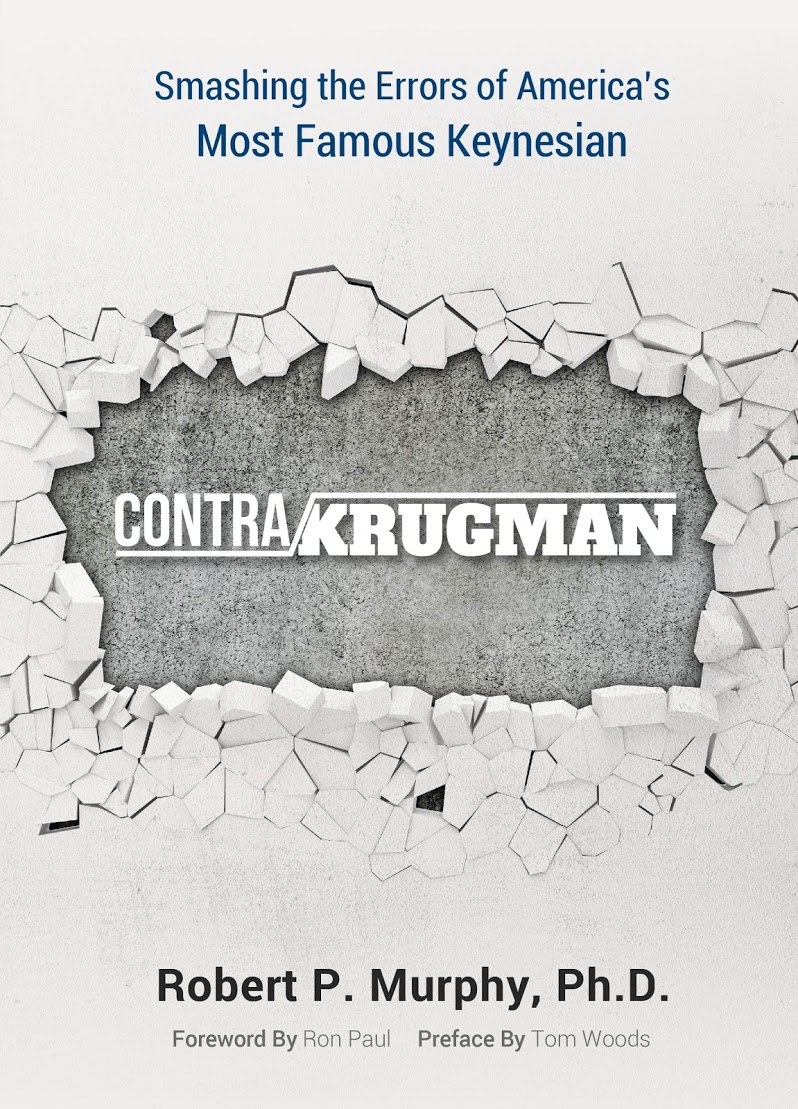Search My Site
Categories
Best Economics Book Ever
Best Economic History Book Ever
How to Fix Health Care
My Introduction to Austrian Economics
Pushing Back Against Krugman
The Case for IBC
Pages
- “My History With IBC [Infinite Banking Concept]”
- *The Three Lads and the Lizard King*
- About
- Academic Work
- Books
- Check out the MURPHY-KRUGMAN DEBATE
- COMMON SENSE: The Case for an Independent Texas
- Contact Me
- Free Advice
- Lara-Murphy.com
- Popular Writings
- PRIVACY POLICY
- Reading List in Austrian Econ & Libertarianism
- Resumé/CV
- Videos
- Writings
My Trade Surpluses
Read at Your Own Risk
- Antiwar
- Big Questions (Steve Landsburg)
- Cafe Hayek (Boudreaux and Roberts)
- EconLog
- Ideas (David Friedman)
- Master Resource (Rob Bradley et al)
- Moneyness (JP Koning)
- MyGovCost Blog
- Satoshi Nakamoto Institute (Bitcoin)
- The Beacon
- Think Markets (Rizzo et al)
- Tom Woods
- Worthwhile Canadian Inititiative (Nick Rowe et al.)
Recent Posts
Recent Comments
- Bernie Jackson on Bernie Jackson on a Flaw with MMT Analogies
- random person on Receipts for BMS Ep 254: Kark Marx Was Kind of a Big Deal
- random person on Receipts for BMS Ep 254: Kark Marx Was Kind of a Big Deal
- random person on Receipts for BMS Ep 254: Kark Marx Was Kind of a Big Deal
- random person on Receipts for BMS Ep 254: Kark Marx Was Kind of a Big Deal








Bob, does Krugman know about your podcast? If not, I think the book is sure to catch his attention, and is likely to provoke a tweet at least, if not a blog post.
The Keynesian method is to ignore contrary evidence, then deride it, then in several years to claim you knew it all along but knew and understood it deeper than the critics did and that their conclusions are still bunk.
For the truly advanced later you claim to have changed your views due to the changing evidence.
When the facts change I get very suspicious about where these so called facts might be coming from.
What do you do sir?
You crack me up Tel. Is there any video of you talking online? I need to put a voice to these words.
The podcast is on the way. I have a microphone and I know how to use it… getting a good story together that people want to could be an important next step. I’ll keep you posted.
Got distracted in the middle of writing that, so you can see the problem, Friday afternoon, long week. Trying to maintain half an hour of unbroken coherence is going to take a bit of additional practice for me.
Who said you need to put together a half hour? I’m a big fan of Mises weekends and the old Lew Rockwell Show, which are/were frequently in the 15-23 minute range.
Lew Rockwell has the magic voice.
My voice is OK, probably better than average but Rockwell is one of the 1% ers when it comes to accent and richness of tone. I would put Rockwell up there with Tom Baker and Vincent Price.
The Keynesians have no starting point for gathering their alleged evidence. They can never find that very specific magic moment in history when the market failed and revealed that it required external government “stimulus” or it would collapse or slow down. Just ask them to identify that moment. They can’t locate it. Ask again. They will call you names.
How about early 2009 in the U.S., etc.?
There’s a reasonably strong case that the stimulus program of 2009 made the recovery worse than it would have otherwise been.
https://mises.org/library/empirical-case-against-government-stimulus
It wasn’t big enough!
This one shows the stimulus results on the one hand vs the sequester on the other hand and why Keynesian predictions were wrong on both counts.
https://www.mises.ca/keynesians-wrong-on-sequester-just-like-stimulus/
The sequester was ridiculously small in the scheme of things but the Keynesian government propaganda tactic is to whip up fear, uncertainty and doubt around the slightest possibility of a cut in government spending. It is therefore very necessary for Austrians to rub their noses in their mistakes over and over, basically forever.
Anyway, the demonstrated outcome is that the spending boost didn’t help the economy and the spending cuts didn’t hurt the economy.
“How about early 2009 in the U.S., etc.?”
Keneysians were calling for, and got, stimulus in early 2008. Bush signed a 150 billion dollar spending bill in February and the Federal Reserve was cutting rates from July 2007 through mid 2008. These actions only seem small and trivial now because of far more massive programs that came later and the recession turned into something far, far bigger than they ever expected.
How could anyone seriously claim that the inevitable end of a Keynesian bubble (which was relentlessly promoted as the right thing to do by Krugman) might be labeled “market failure”?
Contra Krugman, The Flamethrower.
😀
The kids love it!
Also, on Episode #1235 of the Tom Woods show (just past the 35:00 mark) Tom says that this book will make me a master debater.
Yeah, baby.
Yeah.
Pretty cool that you got Ron Paul to write the forward.